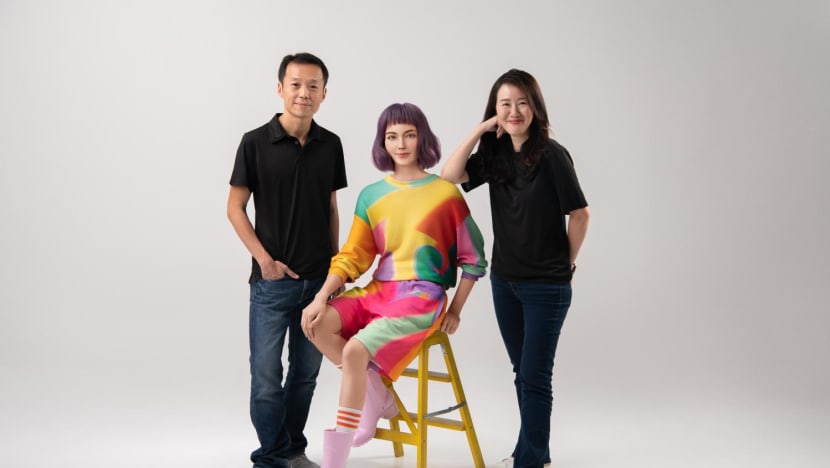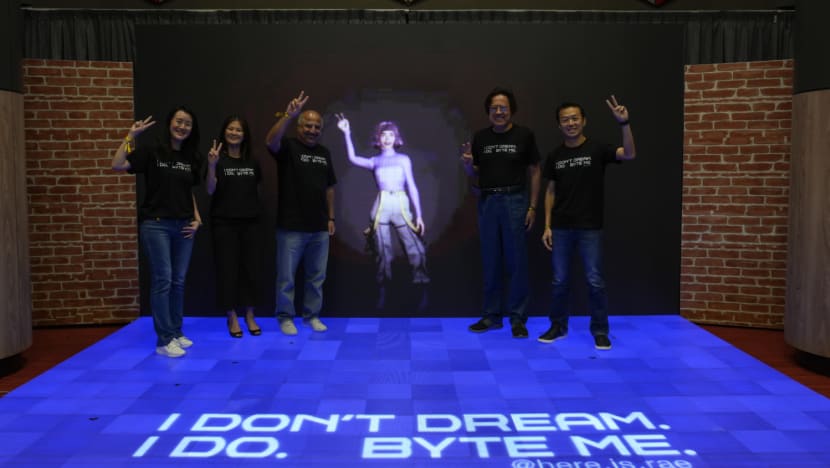CapitaLand reveals it created virtual influencer Rae to test commercial viability of new technology
Rae has more than 24,000 followers on her Instagram account @here.is.rae.

Virtual Influencer Rae with CapitaLand Investment CEO Lee Chee Koon and CapitaLand managing director of digital ventures Tan Bee Leng. (Photo: CapitaLand)
SINGAPORE: Developer CapitaLand announced on Friday (Dec 2) that they created virtual influencer Rae to test the commercial viability of new virtual technology during the COVID-19 pandemic.
Rae, or @here.is.rae on Instagram, was designed as a practical solution to enhance customer engagement by brands in the virtual realm, said the developer's managing director of digital ventures Tan Bee Leng.
The virtual influencer, who was launched in October 2020, has more than 24,000 followers on Instagram. The team behind her was unknown until now.
Rae was digitally created by computer-generated imagery (CGI) technology and powered by artificial intelligence (AI). The virtual influencer has fronted multiple campaigns with fashion brands like Moschino and Gucci, said CapitaLand in a separate press release.
In a press conference on Friday, the developer said it will be handing over usage rights for Rae to marketing and advertising agency network Dentsu.
Adding that the experiment with Rae has exceeded initial expectations, Ms Tan said CapitaLand believes the industry will "stand to gain" from its learnings with the project.
"(The COVID-19 pandemic) was the trigger that got us thinking about what we could do at a time whereby face-to-face interaction, physical interaction was almost impossible," she said on Friday.
"That was the time that our group CEO ... gave us a challenge, of all the things that we are doing for our tenants and our retailers, what else can we do?"

HANDING OVER THE REINS
CEO of CapitaLand Investment Lee Chee Koon said he did not think the company could take the virtual influencer project further.
"For instance, just by doing the digital avatar Rae, we tried to sell NFTs, at the same time, we also try to be able to receive crypto tokens," he shared, adding that the CapitaLand's legal, finance and accounting systems did not allow them to receive cryptocurrency as a fiat currency.
"For things like Rae, I think it's been quite interesting, but I don't think that as a company, we can continue to take it further," he continued.
"That's why we find partners to work with it, hoping that they can take it to much bigger success than what we have brought it."
Responding to a question about why CapitaLand did not reveal itself as Rae's creators from the start, Ms Tan shared that the virtual influencer started as an experiment.
"We really didn't know how far she would go ... We didn't think it was necessary to make it a huge announcement about us creating an avatar," she added.
There was never an intention to keep Rae exclusive to CapitaLand, said Ms Tan.
"We did think about whether it was cool for a virtual influencer to be associated with a company up front. That was part of it, when we think about the demographic as well," she added.
"We figured that the youth and young people don't want to follow someone that is a company mascot."
The virtual influencer has been "quite a successful venture" for CapitaLand, but to get Rae "to the next level", more investment in technology is needed, said Mr Lee.
"And to be frank ... we are an asset management company. We are not a technology company, " he continued, adding that Dentsu has the right skills to take it further.
In response to a question about the costs of hiring Rae compared to traditional in-person influencers, Ms Tan noted that this depends on the needs of the client.
"The biggest difference between a virtual and human influencer is the technology involves. Depending on what the client requires Rae to do, different technology will be deployed, and the technology is the part that has varying costs," she added.
















